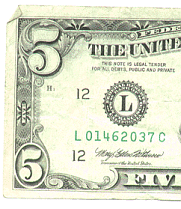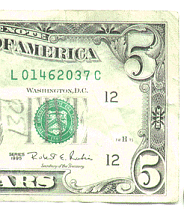A Dollar's Worth of Paranoia
A Dollar's Worth of Paranoia
[As sometimes happens,
Ol' Sam's wonderful paranoia about The
Establishment has caused him, in his learned article on
Fnording Dollar Bills, to neglect the principle of
Ockham's
Knapsack and miss entirely the clear and obvious fact that money isn't
a tool of
THEM -- it's
an aggressive alien life form that is using
us to help it breed. --
Al]
It occurred to me that a single dollar can, by the mere act of changing
hands, generate hundreds of tax dollars over the course of its useful
life. Let's say you live in New York, and you earn a dollar; you buy a
shirt with that dollar, and suddenly 8 cents
is owed to the government; the vendor uses that same dollar to buy a candy
bar, and once more money from taxes flows to the government. Take a more
concrete example -- you have $10 worth of cabbage, and someone gives you
$10 for it. There is still only $10 worth of cabbage around, but all of
a sudden you need $.80 above and beyond that to give to the
government. In fact, once that $10 worth of cabbage changes hands 13 times
in New York, you need $20 in circulation to cover it -- despite
there still
being only $10 worth of cabbage (and that, by this point, rather elderly).
But, I told myself, that money is assumed to be in circulation already; it's
not as if taxes create money -- does it? I decided to do some
looking around. It seems that taxes themselves do not create money --
that job, I found, is left to the
Gross National Product, which is based on the value of goods and
services purchased. So, if you and a friend keep paying each other
the same fifteen dollars to provide some service for each other (say, you
pay him $15 to shake your hand, then he pays you the same $15 to shake his),
you'll eventually bump up the GNP and cause a concomitant increase in
the money supply. What's more, this increase in the money supply has
a tendency to increase spending. So, spending money increases the GNP
(whether that spending was to build a museum, clean up an oil spill or
tear down an old lady's ancestral home -- so long as the money moves,
it doesn't matter why or whence), which increases the money supply,
which causes further increases in spending...
And let's not even get into inflation.
This is how money breeds -- it evolved in
a socio-memetic niche, and is now breeding like fruit flies only
wish
they could. Sure, THEM can use it (even as it uses THEM, in an icky kind
of co-parasitic venture), but money is no more a tool of THEM than
bees are a tool of flowers.
It may seem that the credit industry is poised to deliver its own
memeto-evolutionary version of
a million-ton-meteor impact, but this will only serve to stem the tide
of green paper before it comes flooding down Wall Street like a
plague of rabbits over a New Zealand farm -- and green paper is only
one sub-species of the ubiquitous Dollar. As
Ol' Sam managed to point out,
money lives primarily in our heads, and the
credit industry certainly isn't taking any steps toward bringing money to
extinction there -- indeed, the sub-species of Dollar which lives as an
abstraction will experience a population explosion of untold proportions if
the credit industry ever succeeds in completely unshackling it from
the need for physical representation; the abstract dollar will have
as great an evolutionary advantage over the paper dollar as the paper dollar
did over the gold dollar.
Dollars can multiply utterly unhindered in the abstract, without anyone
needing to figure out where to put several billion tons of paper.
And all the while, they will be sheltered by captains of industry and thrifty
housewives alike; will grow fat on greed, commercialism and envy;
will be transported to new environs by the spread of Western Culture --
until, eventually, they gain illimitable memetic dominion over the human mind.
Assuming, rather optimistically, that this hasn't happened already.







